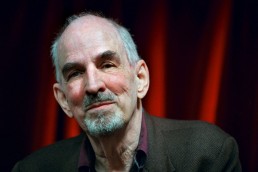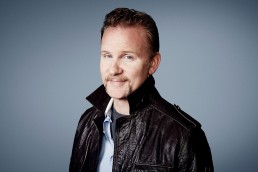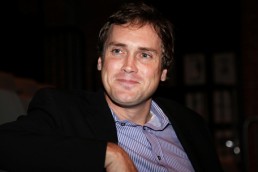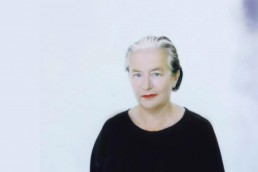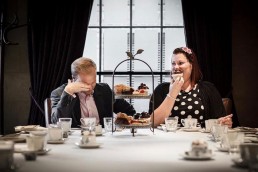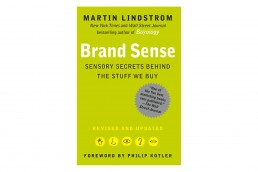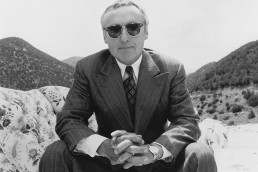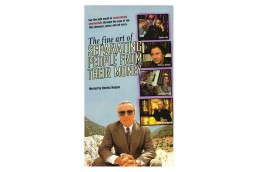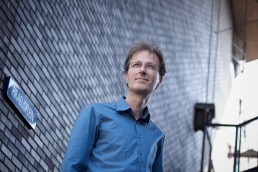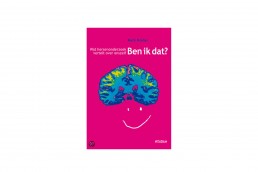Trespassing Bergman - Film makers about the influence of Ingmar Bergman
Trespassing Bergman (re-edit from IMDB)
The idea of famous film makers on a pilgrimage to Ingmar Bergman’s Faro Island home is interesting.
Famous directors and actors who like to talk about the influences that shaped their own work and for whom Bergman represented one of the high achievers of their craft. The interviews Woody Allen playing it straight, Lars Von Trier getting laughs, Robert De Niro, who is notoriously awkward in interviews, at ease and making valid comment. To name but a few. Some music by The Radio Dept. one of Sofia Coppola’s (and my) favourite bands.
Check out the trailer and see the film if you’re interested in making a film yourself. Learn from the best in the industry.
Happyish - Starring Steve Coogan
About Happyish (from IMDB)
It is “different” and does not belong to mainstream and regular type of shows that one may watch. It is not a kind of show that is talked about around water coolers and it is not to everybody’s taste. It is not a kind of show that one watches for sheer purpose of entertainment. Not a kind of show that soothes you, either. It is more like a mirror that reflects how we could get lost in banality of life. It is thought provoking, witty, and intelligent. It is truthful, wry, honest, and cerebral. One of the best shows (sadly underrated and overlooked) in the so called “golden age of television”, that tries to touch the vexed question of “happiness” in modern world and address the “tragic sense of life” in a roundabout way and blended with humor.
Best quote:
‘It’s only tragedy when you don’t see the comedy.’
Hear writer Shalom Auslander talk about an episode in this clip.
The Greatest Movie Ever Sold - Morgan Spurlock
The Greatest Movie Ever Sold – Morgan Spurlock
A documentary about branding, advertising and product placement that is financed and made possible by brands, advertising and product placement.
Basically it’s post modern art that Marcel Duchamp would have loved.
Tom Vanderbilt - You May Also Like
You may also like, taste in age of endless choice.
Why we like the things we like, why we hate the things we hate, and what our preferences reveal about us.
With a voracious curiosity, Vanderbilt stalks the elusive beast of taste, probing research in psychology, marketing, and neuroscience to answer myriad complex and fascinating questions. Comprehensively researched and singularly insightful, You May Also Like is a joyous intellectual journey that helps us better understand how we perceive, judge, and appreciate the world around us.
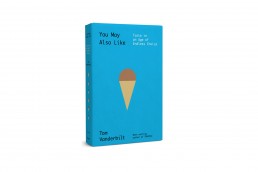
Check out this video to see him talking about the book
Self fulfilling prophecies by Li Edelkoort
Self fulfilling prophecies:
When you have as much clout as Li Edelkoort, your prophecies become self fulfilling. However, it took her almost a lifetime to get there.
'It's the end of fashion as we know it'
Lidewij Edelkoort
Fashion is dead:
Trend forecaster Li Edelkoort has declared, describing the fashion industry as “a ridiculous and pathetic parody of what it has been”
Lidewij Edelkoort, one of the world’s most influential fashion forecasters, used her annual presentation at Design Indaba in Cape Town to fire a broadside at the industry. “This is the end of fashion as we know it.”
Edelkoort said her interest in fashion had now been replaced by an interest in clothes, since fashion has lost touch with what is going on in the world and what people want.
“Fashion is insular and is placing itself outside society, which is a very dangerous step,” she said in an interview.
Edelkoort listed a number of reasons for the crisis in fashion, starting with education, where young designers are taught to emulate the famous names. “We still educate our young people to become catwalk designers; unique individuals,” she said, “whereas this society is now about exchange and the new economy and working together in teams and groups.”

Catering the super wealthy
The World’s Most Expensive Food:
Meet the people supplying and buying £195 chocolate bars, £80,000 bottles of wine and £1000-per-person bespoke dining experiences.
A fine example of extreme marketing for the super wealthy to cater their endless lust for things less wealthy people can’t have. And bloody entertaining too.
Series two of Channel 4’s The World’s Most Expensive Food meets William Hanson to see him at work teaching the art of afternoon tea.
Brand Sense - Martin Lindstrom
The definitive book on sensory branding, shows how companies appeal to consumers’ five senses to sell products.
Did you know that the gratifying smell that accompanies the purchase of a new automobile actually comes from a factory-installed aerosol can containing “new car” aroma? Or that Kellogg’s trademarked “crunch” is generated in sound laboratories? Or that the distinctive click of a just-opened jar of Nescafé freeze-dried coffee, as well as the aroma of the crystals, has been developed in factories over the past decades? Or that many adolescents recognize a pair of Abercrombie & Fitch jeans not by their look or cut but by their fragrance?
In perhaps the most creative and authoritative book on how our senses affect our everyday purchasing decisions, global branding guru Martin Lindstrom reveals how the world’s most successful companies and products integrate touch, taste, smell, sight, and sound with startling and sometimes even shocking results. In conjunction with renowned research institution Millward Brown, Lindstrom’s innovative worldwide study unveils how all of us are slaves to our senses—and how, after reading this book, we’ll never be able to see, hear, or touch anything from our running shoes to our own car doors the same way again.
An expert on consumer shopping behavior, Lindstrom has helped transform the face of global marketing with more than twenty years of hands-on experience. Firmly grounded in science, and disclosing the secrets of all our favorite brands, Brand Sense shows how we consumers are unwittingly seduced by touch, smell, sound, and more.
The Fine Art of Separating People from Their Money
The film is hosted by Hollywood star Dennis Hopper and is directed by Hermann Vaske. Shot in the Atlas Mountains of Morocco, Hopper delivers a powerful performance. Arty as you’ve never seen him before, he puts advertising into perspective of popular culture at the end of the 20th century. Spitting colour, laughing his head off, destroying books, Dennis Hopper sends Hermann Vaske on a mission to talk to the greatest ad men, directors and artists to find out about the crossover between various creative disciplines. In a visually dazzling, wickedly funny slam of creativity and media obsession, Hermann conducts unconventional kinds of interviews
Epilogue
Interesting to see that part 4, which is about using shock as a paradigm and which you should surely skip if you detest shocking imagery, hasn’t survived the test of time. Pulp Fiction by Quintin Tarantino, quoted in this part of the film when it was just released, has.
Is it me? Mark Mieras
Brain research touches on our entire lives. It sheds light on phenomena such as love, empathy, ambition, consciousness, forgetfulness, friendship, addiction, appetite, enjoyment and happiness. On stages of life as childhood, puberty and old age. Ben ik dat? / Is it me? does all this. With this new edition Mark Mieras watches brain research closely. The book is updated with the most recent research and expanded with seven new chapters on: stress, creativity, meditation, sport, intuition, brain stimulation and subliminal influence. A book for anyone with brains.
(Dutch only)
On Creativity:
Get creative!
Creativity is the art of letting go. Creative minds dimm their control centers and keep their attention off-focus. Just a matter of turning the right buttons.
Creativiteit is de kunst van het loslaten. Creatieve geesten dimmen hun controlecentra en houden hun aandacht off-focus. Gewoon een kwestie van aan de juiste knoppen draaien.

